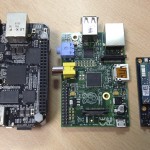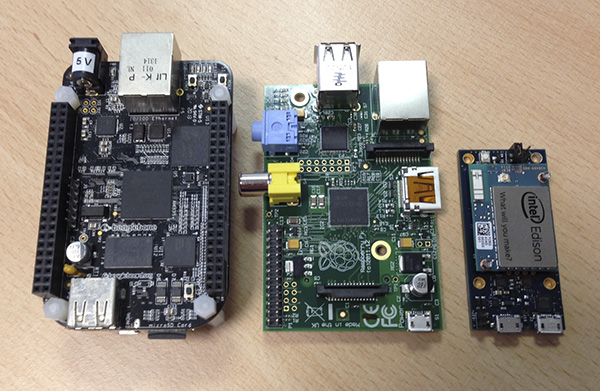 Recently I took delivery of an Intel Edison with a Mini-Breakout Board. I was awestruck by the size of the thing, but it was not until I started using it properly for a couple of projects that I noticed that it seemed a little bit ‘snappier’ than boards I’d used in the past (Raspberry Pi, Beaglebone Black). So I decided to do a little benchmarking.
Recently I took delivery of an Intel Edison with a Mini-Breakout Board. I was awestruck by the size of the thing, but it was not until I started using it properly for a couple of projects that I noticed that it seemed a little bit ‘snappier’ than boards I’d used in the past (Raspberry Pi, Beaglebone Black). So I decided to do a little benchmarking.
The three boards I benchmarked are
- Raspberry Pi (ARM1176JZF-S (ARMv6k) 700MHz)
- Beaglebone Black (Cortex-A8)
- Intel Edison (dual Atom Silvermont @ 500MHz)
The benchmark was done using ‘sysbench’ which I compiled from source on the Edison, and on the other two boards I used apt-get to install the currently available version for the distributions on the board.
It’s worth mentioning that the benchmarks were run single threaded on the Pi and BBB, and 2 threads were used on the Intel Edison. If a single thread was used in the Edison, the timings roughly doubled for each test. Increasing the threads to 2 on the Pi and BBB made very little difference, maybe slowing them down slightly due to the increased context switches.
The benchmark I was most eager to see was the CPU benchmark, which shows that the Intel Edison is well ahead of the Raspberry Pi, and significantly ahead of the BBB. 500 seconds on the Pi versus 72 for the Edison. So it’s no slouch, even for it’s size….
Next test was memory, which showed a more significant difference between the Pi and the Edison, but the BBB managed to close the margin.
However, I suspect there was an incorrect setup in the BBB for the random write test, as it was lagging WAAAY behind the Pi and the Edison. The Edison was still about 5 times faster than the Pi.
And finally, the random read from storage. Back to the typical charts, Pi, BBB, Edison in that order. The Edison still trounces the Pi and the BBB.
So, if you take the results of the Edison being 5 times the speed of a Raspberry Pi in most tests, and it being $75 versus about $35 for a Pi, the Edison is excellent value for money.
All the other pros and cons for each platform are beyond the scope of this blog article, but when you look at the benchmarks here, the Edison is way ahead. Even taking the price into account ($75 for Edison module with a mini-breakout board) it still offers more bang for buck than the other platforms. But the Pi still offers excellent value for what you get, so it all depends on what you’re happy with! I plan on using all of them in future projects! 🙂
Note: All images are (C) 2014 David Hunt – All rights reserved. Not be be used without permission.





Do not forget the community. Here is RPi (and its derivates) far ahead.
Claus, I’m only focussing on the benchmarks here. Talking about all the other pros and cons could start a religious war! 🙂
Any chance you could test the power usage as well Dave? For a lot of projects that would be the critical point.
A measurement of power consumption, comparing it with the PI and beagle would be really interesting/useful
Thanks for your benchmarks, I have another boards and I want to test in the same way as you. Is possible to have the exact line of command used by you in this 4 test, like this:
Test CPU sysbench –num-threads=64 –test=threads –thread-yields=100 –thread-locks=2 run
Test Memory …
Test Random write
Test Random read
sysbench –test=cpu run
sysbench –test=memory –memory-block-size=1M –memory-total-size=10G run
sysbench –test=fileio –file-test-mode=rndwr –file-total-size=16MB prepare
sysbench –test=fileio –file-test-mode=rndwr –file-total-size=16MB –max-requests=1000 run
sysbench –test=fileio –file-test-mode=rndrd –file-total-size=16MB –max-requests=10000 run
For the Edison tests, I added ‘-max-threads=2’
For the Pi & BBB tests, I added ‘-max-threads=1’
Many thanks, at this moment I don’t hove enough time but soon I try to do the same test with RK3066 dual core an ODROID-U3 quad core.
Is ‘–num-threads=XX′ no max-threads
Working on my post I’ll share when finished.
Both rpi and bbb cpu is aging. So is my odroid-xu (quad, 1.6GHz), but here some quick result with it:
cpu bench: 33.3748s
memory bench: 0.3966s
odroid-u3 (quad, 1.7GHz) is $65 (excl. shipping), 3 usb port, RJ-45 Lan Jack, etc. So in some use case, it should be better compared to Edison I guess.
I see my ODROID-U3 very close to your XU.
http://raspberryparatorpes.net/rivales/sysbench-raspberry-pi-vs-todos/
I would be curious to see some power consumption numbers tacked on.
I don’t know how to measure the power consumption.
Here you are my own test:
http://raspberryparatorpes.net/rivales/sysbench-raspberry-pi-vs-todos/
Thanks for sahring.
I just did a quick power measurement on the Edison and Raspberry Pi.
All measurements are approximate as my multimeter is a bit rubbish.
At idle, Pi is 1.38 watts , Edison is 0.34 watts.
with all cores going 100%:
Pi is 1.56 watts, Edison is 0.66 watts.
With wifi on, Edison is 0.94 watts at full cpu load, wifi not transmitting, interface is just enabled.
I don’t have the Beaglebone here, will measure next week.
Any chance of getting the ODROID measurements with the CPU at 100%?
So, the Edison is very comfortably under 1 watt. For a CPU that was on top of all the performance charts above, to also be the lowest power is pretty amazing…..
I’ll add a chart to the article once I get the Beaglebone numbers….
Amazing… I try to pick a multimeter and measure my odroid-u3
I just measured the new Raspberry Pi Model A+. At idle, it’s 80mA @ 5.1V, giving 0.41watts.
I just measured the Imagination MIPS Creator CI20. At idle, it’s 360mA @ 5.0V, giving 1.8 watts.